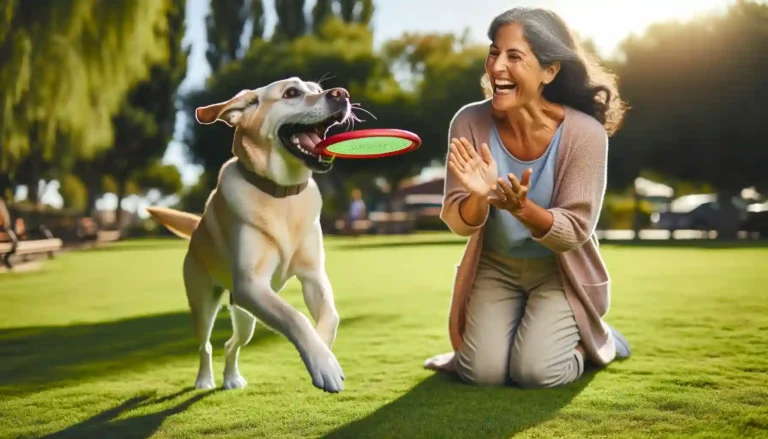Introduction
Picture this: You’re relaxing at home, and your furry friend decides it’s the perfect time for some affection. But instead of the usual hug, they start licking your navel! This amusing but unique behavior is a common curiosity among dog owners. Why do dogs do that? This may be due to their innate grooming habits, their exploratory senses or simply their way of getting attention and affection. Let’s dive into the fascinating world of dog behavior and find out why your dog might find your navel so interesting.
Understanding Dog Behavior
Spontaneous Behavior
Rooted in Lineage: Like their wolf ancestors, dog’s behavior is often driven by deep underlying instincts.
Scent Detection
Powerful Olfactory System: Dogs have an advanced sense of smell, far exceeding human abilities.
Interpretation of smell: They use this sense to interpret environmental odors, including the unique smell coming from your navel, which can tell them about your health, diet, and emotional state.
Grooming and Affection
Bonding Through Grooming: This behavior is reminiscent of the grooming habits seen in wild dogs, which shows care and affection.
Pack Mentality: When a dog licks you, he may consider you part of his pack, interpreting this behavior as a sign of belonging.
Curiosity and Exploration
Exploratory Nature: Beyond instinct, dogs are naturally curious, using their senses to explore their surroundings.
Licking as a Probe: They may lick your navel not only out of affection, but also as a way to investigate its unique smell and taste, different from other parts of your skin.
Human-Dog Bond

Seeking Attention and Affection
Deep Emotional Bond: The relationship between humans and dogs is marked by mutual affection and understanding.
Initiating Conversation: Dogs often lick to initiate conversation, which strengthens their bond with owners.
Sign of Valuing a Partner: Licking the navel may be their way of getting your attention and affection, showing that they value your presence.
Relaxing and Soothing
Attuned to Human Emotions: Dogs are incredibly responsive to the emotional state of their human companions.
Licking as a Form of Comfort: They may lick areas such as the navel to provide comfort or respond to their owners’ perceived discomfort.
Empathy and Solidarity: This behavior reflects their sympathy and willingness to offer solace and support.
Appreciating the Canine Connection
Deeper Understanding: Recognizing these aspects of the human-dog relationship increases our appreciation of their complex emotional lives.
Expressions of Attachment: Actions such as belly button licking are expressions of their innate desire to connect, comfort, and communicate with their human friends.
Health and Hygiene Considerations
Potential Health Concerns for Dogs
Natural Behavior, Potential Risks: Licking is natural but may involve health risks if certain substances are ingested.
Hazardous Substances: Lotions, creams and topical products in the navel area can be harmful if licked or swallowed.
Microbial Exposure: Bacteria and other microorganisms can accumulate in the navel, posing a risk to pets.
Sanitation for Humans
Importance of Human Hygiene: Good hygiene is important, especially in often neglected areas like the navel.
Preventing Health Problems: Regular cleaning of the navel area is essential to avoid health problems, especially if your pet licks this area.
Interpersonal Hygiene: Ensuring hygiene during interactions with your pet promotes health for both and promotes a safe environment for their affectionate behavior.
Overall Health and Safety
Managing Health and Hygiene: Understanding and managing these aspects is important to maintain the well-being of both pets and their owners.
Mental Enjoyment: Being aware of these ideas can help you appreciate your pet’s quirky habits without compromising health and safety.
Practical Training and Management

Training Tips
Redirect Attention: When your pet starts licking your navel or legs, redirect them with a toy or other activity.
Consistency in Training: Constantly redirecting them away from the navel teaches them that this is not a desired behavior.
Positive Reinforcement
Rewarding Desired Behaviors: Encourage preferred behaviors with treats, affection, or verbal praise.
Creating Positive Associations: Use positive reinforcement to establish a positive association with the desired behavior rather than focusing on punishment.
When to Seek Professional Help
Recognizing Excessive Licking: Be wary of excessive or compulsive licking, which may be a sign of underlying issues such as anxiety.
Professional Counselling: If behavior management strategies are ineffective, consult a veterinarian or dog behavior specialist for tailored advice and possible medical evaluation.
Ensuring Pet Well-Being: Professional guidance can be vital in maintaining your pet’s health and peaceful home environment.
Conclusion
In short, pets licking your navel is a strange mix of instinct, curiosity and affection mixed with health and hygiene considerations. This amusing behavior highlights the unique and complex nature of our furry friends.
Have you caught your pet acting strange? Share your stories or suggestions below. Let’s enjoy and learn from the whimsical world of our beloved pets together!

